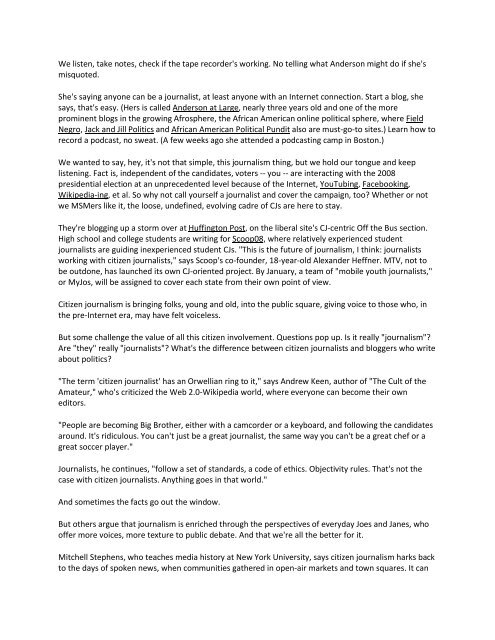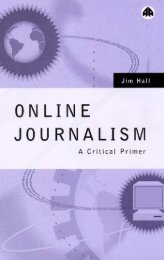Modul Mata Kuliah Journalisme Online - Ayo Menulis FISIP UAJY
Modul Mata Kuliah Journalisme Online - Ayo Menulis FISIP UAJY
Modul Mata Kuliah Journalisme Online - Ayo Menulis FISIP UAJY
You also want an ePaper? Increase the reach of your titles
YUMPU automatically turns print PDFs into web optimized ePapers that Google loves.
We listen, take notes, check if the tape recorder's working. No telling what Anderson might do if she's<br />
misquoted.<br />
She's saying anyone can be a journalist, at least anyone with an Internet connection. Start a blog, she<br />
says, that's easy. (Hers is called Anderson at Large, nearly three years old and one of the more<br />
prominent blogs in the growing Afrosphere, the African American online political sphere, where Field<br />
Negro, Jack and Jill Politics and African American Political Pundit also are must-go-to sites.) Learn how to<br />
record a podcast, no sweat. (A few weeks ago she attended a podcasting camp in Boston.)<br />
We wanted to say, hey, it's not that simple, this journalism thing, but we hold our tongue and keep<br />
listening. Fact is, independent of the candidates, voters -- you -- are interacting with the 2008<br />
presidential election at an unprecedented level because of the Internet, YouTubing, Facebooking,<br />
Wikipedia-ing, et al. So why not call yourself a journalist and cover the campaign, too? Whether or not<br />
we MSMers like it, the loose, undefined, evolving cadre of CJs are here to stay.<br />
They're blogging up a storm over at Huffington Post, on the liberal site's CJ-centric Off the Bus section.<br />
High school and college students are writing for Scoop08, where relatively experienced student<br />
journalists are guiding inexperienced student CJs. "This is the future of journalism, I think: journalists<br />
working with citizen journalists," says Scoop's co-founder, 18-year-old Alexander Heffner. MTV, not to<br />
be outdone, has launched its own CJ-oriented project. By January, a team of "mobile youth journalists,"<br />
or MyJos, will be assigned to cover each state from their own point of view.<br />
Citizen journalism is bringing folks, young and old, into the public square, giving voice to those who, in<br />
the pre-Internet era, may have felt voiceless.<br />
But some challenge the value of all this citizen involvement. Questions pop up. Is it really "journalism"?<br />
Are "they" really "journalists"? What's the difference between citizen journalists and bloggers who write<br />
about politics?<br />
"The term 'citizen journalist' has an Orwellian ring to it," says Andrew Keen, author of "The Cult of the<br />
Amateur," who's criticized the Web 2.0-Wikipedia world, where everyone can become their own<br />
editors.<br />
"People are becoming Big Brother, either with a camcorder or a keyboard, and following the candidates<br />
around. It's ridiculous. You can't just be a great journalist, the same way you can't be a great chef or a<br />
great soccer player."<br />
Journalists, he continues, "follow a set of standards, a code of ethics. Objectivity rules. That's not the<br />
case with citizen journalists. Anything goes in that world."<br />
And sometimes the facts go out the window.<br />
But others argue that journalism is enriched through the perspectives of everyday Joes and Janes, who<br />
offer more voices, more texture to public debate. And that we're all the better for it.<br />
Mitchell Stephens, who teaches media history at New York University, says citizen journalism harks back<br />
to the days of spoken news, when communities gathered in open-air markets and town squares. It can
















